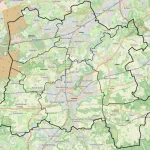Rural ISP Gigaclear Ends 2018 with 93,000 Full Fibre UK Premises
Rural ISP Gigaclear, which has been struggling to deploy a 1Gbps Fibre-to-the-Premises (FTTP) broadband network to some of England’s most challenging communities, has posted its results to the end of 2018 and revealed that they now cover 93,000 premises (up 58% over 2017) and have 19,000 live customers (up 30%).
Unfortunately 2018 proved to be a very difficult year for the ISP, which saw significant delays impact their state aid supported Building Digital UK contracts in Berkshire, Northamptonshire, Fastershire (Gloucestershire and Herefordshire), Essex, Devon and Somerset (here, here, here, here and here). As a result some locations may now have to wait around 2 years longer than expected for their full fibre service to arrive.
Gigaclear’s Chairman of the Board, Stephen Nelson, acknowledged in the new report that their “build volumes have been running behind our expectations, mainly as it has proved more challenging than expected to ramp up the necessary contract resource to build in line with the business plan’s assumptions.”
Advertisement
Stephen pointed to “higher build costs than originally planned,” which he said became evident after “more detailed network designs and surveys were completed.” But he added that the ISP, which was purchased by Infracapital for £270m last year (Railpen also remain an active shareholder), had “financially strong, supportive controlling shareholders, a new management team and a significantly changed Board.”
Highlights of the 2018 Results
* 93,000 premises passed, but only 66,000+ of those are currently considered to be fully ready for service.
* Some 34,000 premises were added over the last year alone (annual increase of 58%), but only 12,000 of those are complete and ready for service.
* Live customers grew by 30% in the year to total 19,000.
* Headcount (staff) grew to 272 (up from 206 at the end of 2017).
* Gigaclear’s BDUK linked contracts reflect a pipeline of 250,000 premises, which will be delivered over the next few years.
* The ISP was charged a total of £3.8m last year for highways defects.
* Infracapital will inject an additional £85m this year to help deliver on the BDUK contracts (albeit later than planned).
We suspect that the delays have probably also impacted Gigaclear’s previous ambition to cover 350,000 premises by the end of 2021, although the ISP appears to be staying upbeat and that’s despite the additional threat from growing competition. As Stephen Nelson said, “We firmly believe that Gigaclear has the right technology, is in the right market and at the right time.”
Gareth Williams, Gigaclear’s CEO, said in the report:
“We still expect that over time BT and other providers may build FTTP, FTTC or G.fast networks to a proportion of our ‘target’ communities, in which case the financial investment may be more difficult to justify.
However, we do keep our options open and review opportunities in a way which is consistent with the company’s strategy and which could deliver attractive returns for shareholders.”
On the financial front the ISP generated revenue of £9m (up from £7.4m in 2017) and a gross profit of £6.5m (£3.7m in 2017). The consolidated loss for the year was £27.4m (£13.7m), although this is perhaps to be expected because they’re in the big build phase; payback periods for a lot of full fibre providers often run to well over a decade (i.e. you expect to see more money going out than coming in).
Going forward the provider plans to “increase the speed of rollout and reduce build costs.” On top of that they aim to harness Openreach’s recently revised Physical Infrastructure Access (PIA) product in order to run their own fibre optic cables through the operator’s existing ducts, although like most ISPs they’ll probably be very selective about where and how this is adopted.
Advertisement
As a fibre optic builder Gigaclear’s total assets are currently said to be worth £171m and they have total liabilities of £37.5m (net assets £133.47m). Credits to Jim for spotting the results update.
Mark is a professional technology writer, IT consultant and computer engineer from Dorset (England), he also founded ISPreview in 1999 and enjoys analysing the latest telecoms and broadband developments. Find me on X (Twitter), Mastodon, Facebook, BlueSky, Threads.net and Linkedin.
« Openreach Discount UK Dark Fibre Alternative – Adds 7 Yr Contract

















































Comments are closed